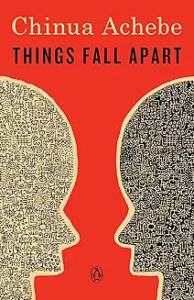Things Fall Apart by Chinua Achebe 1959
Chinua Achebe was a Nigerian novelist, poet, and critic who is regarded as a central figure of modern African literature. This book was his first novel and magnum opus and occupies a pivotal place in African literature. remaining today the most widely studied, translated, and read African novel. It was written nearly 75 years ago at a time when African nations, including Nigeria, were beginning to gain their independence from European colonialist nations.
The book is a haunting and beautiful depiction of tribal life in a small African village prior to the arrival of the British and the devastating impact that the British colonial administration and the Church of England had on this Edenic setting. The central character is Okonkwo, a warrior and a wrestler, who despite being the son of a ne’er do well, has risen to a position of respect, power, and wealth in his village, one of nine in a larger Ibo area called Umuofia. We meeet Okonkwo when he is named by his village to be the emissary to the village of Mbaino where a member of his village had been murdered. His mission is successful, returning with gifts and avoiding war. The book chronicles the daily and annual cycle of events in the village—planting, harvesting, festivals, funerals, births—all a part of an ancient tradition that has evolved to support kin and avoid war with others. All is not happy, however, as Okonkwo is exiled at one point for seven years because he had accidentally killed a member of the clan. After his exile, Okonkwo returns but life has changed. An Anglican church has been built and many clan members have converted to Christianity. When the church is burned down by the villagers, the British District Administrator imprisons Okonkwo and five others who are released upon paying a large fine. When Okonkwo gathers the clan to plan war, a messenger from the British orders them to disperse and Okonkwo kills him. The final scene of the book is disturbing and a sign of the future.
The book is an important contribution to understanding the rich and complex society the African tribes had built over centuries before the arrival of the Europeans. Blended with my recent visit to the Museum of African American History in D.C., my education about Africa, the slave trade, and the ongoing stain of racism in America continues. Achebe’s choice of a poem by the British poet W. B. Yeats might have been an ironic gesture on his part or he may have identified with the English domination of Ireland. Yeats’ wrote “Turning and turning in the widening gyre/The falcon cannot hear the falconer;/Things fall apart; the center cannot hold;/Mere anarchy is loosed upon the world.” We, in addition to Achebe 75 years ago, may well be about to face the same chaos that engulfed Nigeria and the other newly independent nations of Africa in the late 20thC and continuing into today. November 5th will cast some light on that question.



